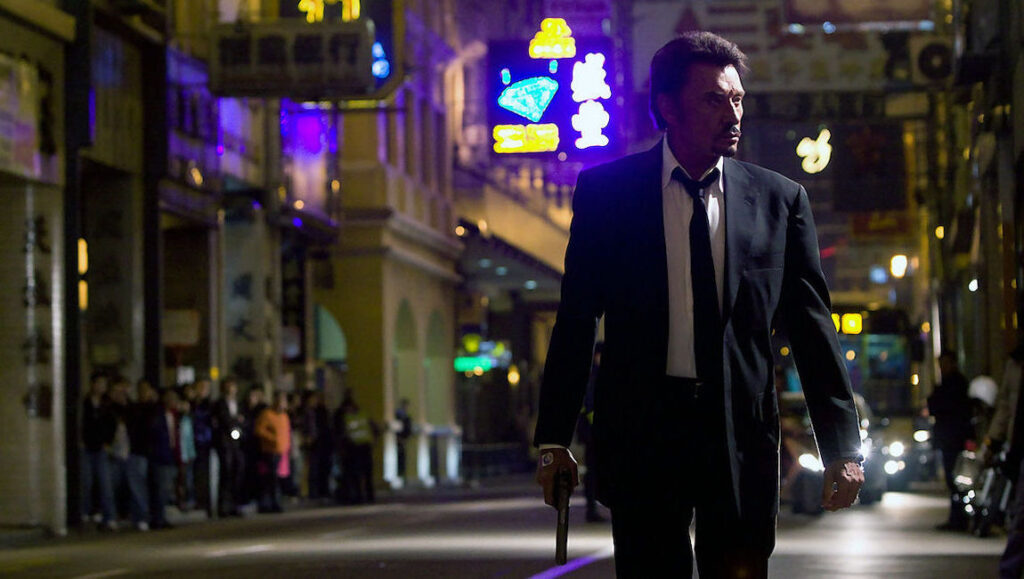With Vengeance, Johnnie To once again makes art of action. In a stylish Hong Kong thriller held captive by the stoic auspices of French king-of-cool Johnny Hallyday, To delivers genre ingenuity with such ease that every sequence is a reminder that even average To is still heads and shoulders above most everything else. Vengeance feels like the natural outcome to To’s long-distance love affair with France, dating back to around the time PTU and Breaking News both screened at the Cannes Film Festival in 2004. To’s status in the international film community has grown with each successive visit to the Promenade, fostering the Vengeance co-production between Hong Kong’s Media Asia and France’s ARP Sélection. The finished product is a film that acts with local bravado but thinks with global élan.
Francis Costello (Hallyday) travels to Macau where his ex-pat daughter (Sylvie Testud, brilliantly cast for her brief role) is the only survivor of a cold-blooded assassination that leaves her husband and two young sons dead. As his daughter struggles to tell him something, Costello instructs her to direct his hand to the words she wants to say on the cover of a French newspaper. As if acknowledging that crime thrillers percolate on every front page in every language, she points to key phrases “three men,” “one shot,” “lost ear” and finally “venge-moi” (avenge me). So Costello, a stranger in a strange land, sets off to do exactly this.
And as luck would have it, he soon stumbles across three hitmen — Kwai, Fay Lok, and Chu (played by To regulars Anthony Wong, Lam Suet, and Gordon Lam respectively) — fresh off a job for their evil yet dapper boss Fung (Simon Yam). It comes as little surprise that Costello has a knack for identifying, finding, and procuring professional killers, and he offers all his cash along with his house and restaurant in Paris to the trio in exchange for their help in finding the murderers of his son-in-law and grandchildren. The three accept his offer, and Costello snaps Polaroids so he can “remember them.” It’s a scenario meant to set up an eventual Memento-like twist, but it also elicits a moment of subtle humor that implies the old “foreigner can’t tell the Asian guys apart” joke.
Men of few words in their own language, the four assassins use English sparingly as a stilted crutch for rudimentary communication. Costello and Kwai define themselves by their calculated actions and close observations. Costello cooks. Kwai, Fay Lok, and Chu investigate. And as Costello eventually reveals, he’s no stranger to guns, and proves it by silently assembling one faster than Chu — with a blindfold on no less. These are the games this director plays, games of affectation, entertainment, and adoration, not unlike the classic Shaw Brothers’ films of Chang Cheh. As an ovation to their newfound brotherhood, the group test handguns in a junkyard by propelling an abandoned bike, one shot at a time. This is classic To: smart, funny, and extremely cool.
But amongst all this posturing, one almost forgets about the stated mission of vengeance. It’s an amnesiac flourish that Vengeance falls into and that clearly mimics a key plot device, but the film fails to fully capitalize on this connection. Costello, we learn, has a bullet lodged in his head that will cause him to eventually lose his memory. (Hence the Polaroids.) To nearly rolls out the red carpet for an action film allegory when a confused Costello asks, “What is revenge?” The question lingers and perhaps gets answered in the unfortunate fates of Kwai, Fay Lok, and Chu, but eventually it’s lost as the film resigns itself (right alongside Costello) to seek vengeance for the sake of vengeance. The last third of Vengeance travels a well-trodden path and sputters to an end of little consequence.
The nuance of Vengeance can certainly be found in other areas, most notably when guns are drawn. A delirious nighttime shootout plays with the mind almost as much as the smoke-and-mirrors finale in Mad Detective. Waiting for the full moon to appear from behind the clouds, the men are trapped in the dark, both physically and mentally, guns drawn, adrenalin pumping. Dodging bullets is no easier than delivering them. Of course, the same is true in a showdown in broad daylight. Like a 21st-century addition to Sun Tzu’s The Art of War, large bails of compacted trash are tumbled into battle formation with absurd finesse. To has a knack for infusing modern triad warfare with unique props that never fail to stir either visually or psychologically and Vengeance is no different.
The overriding personality of Vengeance, however, resides in its landscapes. To returns to Macau, where he shot Exiled, and makes the most of its mixture of garish casinos, provincial architecture, and seaboard wastelands. But probably the most important landscape is Johnny Hallyday’s face. Taking a role that Alain Delon turned down, Hallyday doesn’t so much act as he does simply exudes a phlegmatic presence behind a well-weathered and angular face. For viewers unfamiliar with Hallyday as an icon, like myself, his distinctive look never wears off. For French viewers, there must be some kind of opposite effect of seeing a familiar face in unfamiliar territory. Either way, Hallyday represents some spirited casting by French producers Michèle and Laurent Pétin.
In the end, Costello finds his vengeance, but there is little resolve. Loose ends hang in the breeze on the beach where Costello is left to while away his forgetful days. Longtime collaborating scriptwriter Wai Ka-Fai leaves open holes that To fails to fill on delivery. There’s not nearly as much effort put into defining the space that concludes Costello’s mission as there was defining and polishing its inception. We’re given a reason for his daughter’s tragedy, but little reasoning. Allegiances lose their meaning to the dog-eared destiny of our heroes. France, his daughter, and revenge have vanished from Costello’s memory, lessening the conviction of an otherwise stellar film.


Comments are closed.